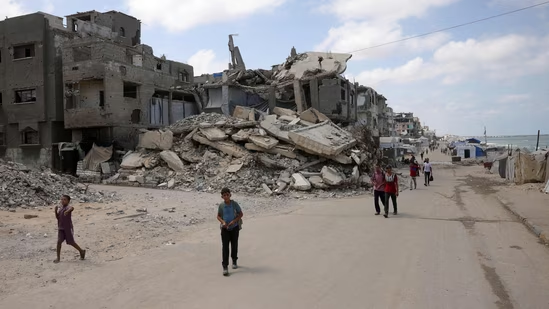
Netanyahu
Israeli Prime Minister Benjamin Netanyahu has vowed to “complete the job” in Gaza, signalling an uncompromising continuation of military operations against Hamas despite mounting international criticism and a rapidly rising death toll among Palestinian civilians. The statement, delivered during a televised address, comes amid one of the most intense phases of the Israel-Hamas conflict in recent months.
The Escalating Conflict
The ongoing war was triggered by a sudden and deadly Hamas assault on southern Israel, which resulted in hundreds of Israeli deaths and the abduction of several civilians and soldiers. Israel responded with large-scale airstrikes, artillery fire, and ground operations, targeting Hamas leadership, tunnel networks, and rocket-launching sites across Gaza.
According to the Gaza Health Ministry, the Palestinian death toll has now climbed into the thousands, with a significant proportion of casualties being women and children. The densely populated enclave has seen widespread destruction of homes, hospitals, and infrastructure, leaving much of the population without shelter, electricity, or access to clean water.
Netanyahu’s Defiant Stand
Speaking from the Israeli Defense Ministry headquarters in Tel Aviv, Netanyahu said the mission was far from over. “We will not stop until Hamas no longer poses a threat to the citizens of Israel. We will complete the job,” he declared. He stressed that Israel’s goal was the total dismantling of Hamas’ military capabilities and governance structure in Gaza.
The Prime Minister’s remarks came as Israeli forces intensified their operations in central and southern Gaza, areas that had previously been declared as “safe zones” but are now witnessing renewed fighting. Netanyahu argued that any pause in the offensive would allow Hamas to regroup and rearm, prolonging the conflict.
Mounting Civilian Toll
International humanitarian organisations have repeatedly expressed alarm over the spiralling civilian casualties. The United Nations reports that hundreds of thousands of people have been displaced, with many seeking refuge in overcrowded UN shelters that themselves have come under fire.
Israel maintains that Hamas embeds its fighters, weapons, and command centres within civilian areas, using residents as human shields—a charge that Hamas denies. Netanyahu defended his country’s military conduct, saying, “We take every precaution to avoid civilian harm, but the responsibility for these tragedies lies with Hamas.”
International Reaction
World leaders and humanitarian groups have urged Israel to agree to a ceasefire to allow humanitarian aid into Gaza. The United States, Israel’s closest ally, has backed its right to self-defence but has also pressed for the protection of civilians and the facilitation of relief operations.
US Secretary of State Antony Blinken reiterated Washington’s stance, saying, “Israel has the right to defend itself against terror, but it must also do everything possible to avoid civilian casualties and ensure humanitarian access.” Meanwhile, several European countries have voiced stronger criticism, calling for an immediate cessation of hostilities.
On the other side, nations such as Iran, Turkey, and Qatar have condemned Israel’s actions as disproportionate and in violation of international law, while pledging continued support for the Palestinian cause.
Humanitarian Crisis Deepens
The humanitarian situation in Gaza has reached critical levels. Hospitals are overwhelmed, operating without adequate medical supplies, fuel, or electricity. According to the World Health Organization (WHO), dozens of healthcare facilities have been damaged or destroyed, severely limiting the ability to treat the wounded.
Food shortages are also worsening, with aid convoys struggling to enter the enclave due to ongoing fighting and security restrictions. The UN has warned of a looming famine if access to essential goods is not restored immediately.
The Military Perspective
Israeli defence officials argue that the operation is making significant progress in eliminating Hamas’ capabilities. They claim to have destroyed several key tunnel networks, weapons storage sites, and command posts. Dozens of senior Hamas commanders have reportedly been killed, although the group continues to launch rockets into Israeli territory.
Hamas, for its part, insists it will continue to resist, portraying the conflict as a fight for Palestinian rights and sovereignty. In recent statements, the group has vowed to retaliate against Israel “in ways it has not seen before.”
Prospects for Peace
With neither side showing signs of backing down, the prospects for a negotiated settlement remain slim. Efforts by Egypt, Qatar, and the United Nations to broker a temporary truce have so far yielded only short-lived pauses in fighting.
Netanyahu’s vow to “complete the job” suggests that Israel is prepared for a protracted campaign, potentially lasting weeks or even months. Analysts warn that this could lead to further civilian suffering and regional instability, as tensions spill over into neighbouring Lebanon and the West Bank.
Conclusion
The Israel-Hamas conflict remains locked in a deadly cycle of attack and counterattack, with civilians paying the highest price. Netanyahu’s defiant pledge indicates that the military campaign will continue until Israel’s stated objectives are met, but whether this approach will bring lasting security—or deepen an already devastating humanitarian crisis—remains uncertain.
As the world watches, calls for restraint grow louder, but on the ground, the bombs continue to fall, and the human cost keeps rising.
Thanks For Reading